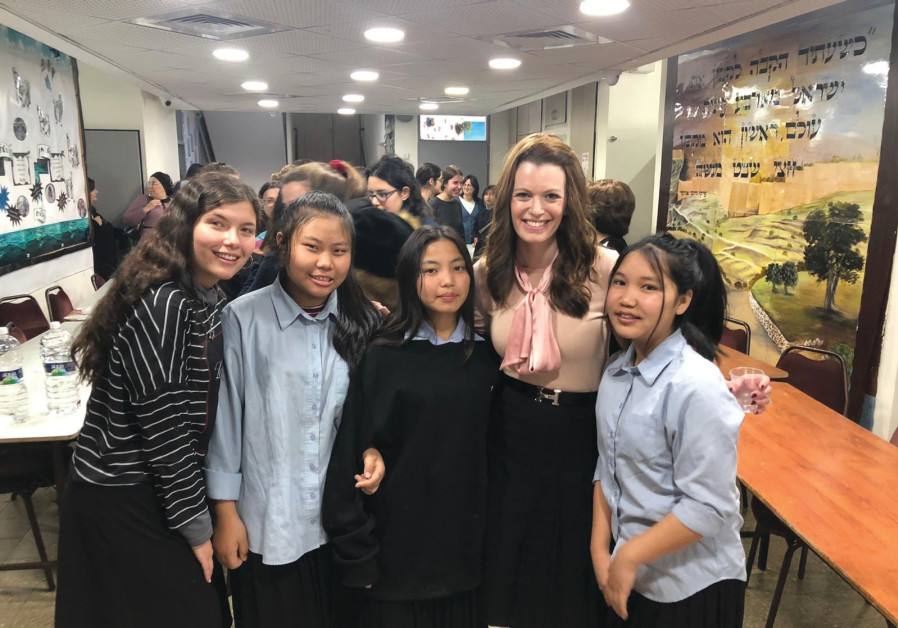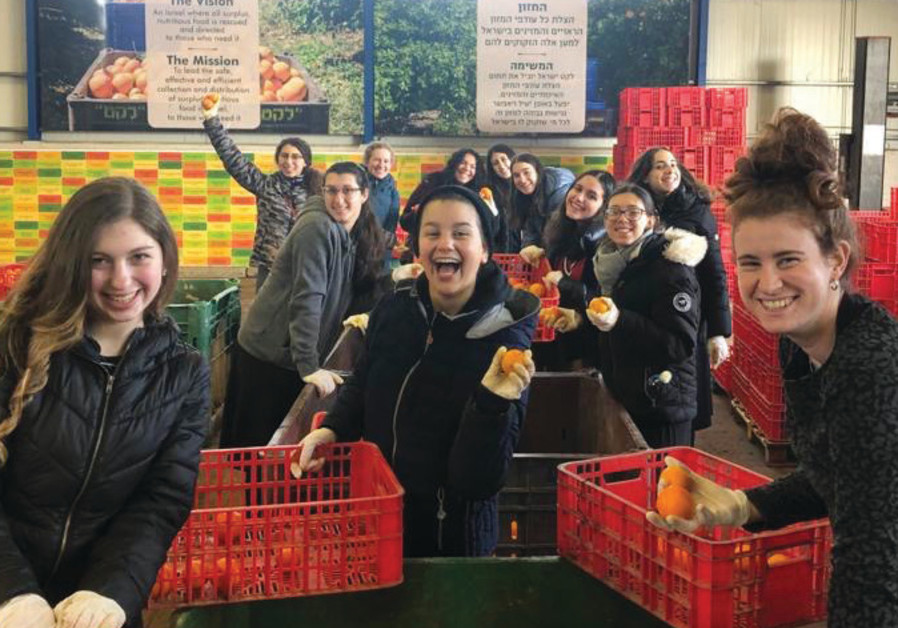When young adults leave their homes abroad for a gap year of intensive Judaic studies in Israel, many discover that hands-on learning experiences are among their most memorable and meaningful.
Kedma was founded in 1996 by rabbi and lawyer Maury Kelman, who saw a need to bolster gap year students’ connections to Judaism and Israel before college. Over the years, Kedma’s mission has evolved fully to gap-year hessed, or compassion, programming. Busy seminaries that want to give their students quality volunteer opportunities can outsource their hessed programs to Kedma, which provides students with meaningful service-learning initiatives.
When Seif was hired by Kelman two year ago, she conducted market research to see how Kedma could be most relevant. Based on feedback, Kedma launched two key programs that built on its partnerships with a broad range of Israeli nonprofits: the monthly Kedma Cohort Program and the weekly Kedma Volunteer Program.
When Sophie Frankenthal, 18, from Chicago, began her year at Michlelet Mevaseret Yerushalayim (MMY) seminary last year before the pandemic began, she eagerly joined the Kedma Cohort Program. The application-only program brought together 50 young women from 15 schools. Each month, participants learned about a unique hessed organization or opportunity that helped them gain not only leadership skills but insight into various facets of charitable work in Israel. Or as Seif describes it, “to get to know Israeli society by giving back.”
Frankenthal loved the variety and depth of the program. At the kick-off meeting, participants learned about Kedma’s founding from chairman Kelman, and were tasked to create a hessed initiative they could execute themselves. As a result, students started preparing and distributing sandwiches and hot chocolate to Jerusalem’s homeless.
“A lot of us came from places where we couldn’t really connect to the homeless,” says Frankenthal. “But coming to Israel and seeing that these were our brothers and sisters helped us connect on so many levels.”
For Hanukkah, the Cohort threw a party at Bayit Lepletot – Girls Town, a home for girls that includes orphans from the Bnei Menashe community and at-risk teens. In January, they toured Leket Israel’s headquarters, where the volunteers packed oranges for those in need. Chairman Joe Gitler also shared insights with the group about his founding of Leket, which included intensive research about food rescue. For Frankenthal, Leket “was an incredible opportunity to recognize all the things that go into helping people. Behind the scenes there is so much planning that goes into making a successful charitable organization.”
ADINA HIRSCH, 19, from Florida, also found meaning in her volunteer experiences with Kedma last year while she was studying at Midreshet Torah V’Avodah (MTVA). The young women at the seminary took part in the Kedma volunteer program, where some 150 students received training and began volunteering weekly.
Kedma placed Hirsch through its partner organization Friendship Circle of Baka, run by Nechama Dina Hendel. Hendel paired Hirsch with Or, a 4-year-old Israeli with autism, whom Hirsch would visit weekly.
“It was really fantastic,” says Hendel. “The family and the little boy Or were delighted, and Adina did it with so much love and joy.”

WHEN COVID-19 hit and Israel first locked down, most students went home, which brought Kedma programs to a standstill. The organization needed to get creative. Abby Sacks, the eim bayit (“house mother”) at MTVA responsible for extra-curricular activities, marvels over how quickly Kedma pivoted.
“The whole world was shutting down, but Kedma kept going,” she says. “We could have regarded the situation as the cup half empty, but we chose to look at COVID-19 as an opportunity. We have this amazing base of volunteers, so how could we mobilize them to help, both in Israel and internationally?”
Kedma launched Dial-A-Savta which pairs volunteers with savtas (grandmothers) and sabas (grandfathers), connecting via phone and Zoom video calls to offer company and conversation. Kedma expanded beyond Israel to partner with organizations including GIFT UK in London and JASA in New York City, and broadened its volunteer base to include college students and professionals.
Frankenthal and Hirsch quickly signed up with Dial-A-Savta. Hirsch, who had returned to Florida, was paired with a New York savta, and they quickly bonded.
“What was really nice is that my savta spends a lot of her time listening to shiurim. I had just come back from seminary, so she was really interested to hear about my Zoom classes, and she would share some Torah with me, and that was a really meaningful way that we formed our connection.” Now in college, Hirsch continues to speak with her savta every week.
Frankenthal also embraced Dial-A-Savta.
“I actually stayed in Israel for the remainder of the school year,” says Frankenthal. “I was set up with an incredible woman with whom I still talk a few times a week. I was the one volunteering, but it was a hessed to me, at a time when my family was back in America, to have someone new to talk to.... It feels like I am investing in something very rewarding, and I’m thankful for this great opportunity that came out of a difficult situation.”
Building on the success of Dial-A-Savta, Kedma launched another initiative called Homework Helpers, which links volunteers with children from families acutely affected by COVID-19, including single-parent families and families struggling economically, to help them with their school work.
Hirsch also volunteered through Homework Helpers and maintains, “If I didn’t have these volunteering opportunities, I would have just done my own thing, watched Netflix, hung out with my friends, socially distant, but I wouldn’t have done anything meaningful with my summer. I think having my savta to call and this girl to help with homework showed me that even when I am stuck at home I can still find ways to do meaningful things.”
By the time a new crop of students arrived in September, Kedma had reimagined its Israel programs.
“We re-created the Kedma Volunteer Program with two different tracks; one with more traditional in-person volunteering within COVID-19 restrictions, and a second track limited to remote volunteering.” This way, “whatever happens over the year, Kedma students need not stop volunteering. This is especially important during the pandemic, when the value of community is heightened and people around us are suffering in different ways.”
Kedma has almost 200 students from four seminaries – Oryah, Midreshet Tehillah, Baer Miriam, and MTVA – participating in this year’s volunteer program.
Sacks says MTVA was eager to partner with Kedma again (Seif’s husband is head of the program). When students first arrived and found themselves in travel quarantine, Seif used Zoom to introduce Kedma’s numerous volunteer opportunities so that when their quarantines ended they could be off and running.
Hayley Schrieber and Rachel Charendoff were new students who appreciated that MTVA gave them Tuesday afternoons each week to participate in Kedma programs.
Charendoff shares, “I was worried that because of pandemic I wouldn’t know what this year would look like. I assumed volunteering would be very difficult to do.... I was surprised and excited that it could still be such a big part of my year and would be something I could still look forward to.”
When Israel locked down over the holidays, Kedma brought the volunteering to the students. Three Kedma seminaries had students juicing pomegranates for cancer patients in a program run by Michal Goldberg and Nechami Luxemburg. Another program had students preparing packages for children in quarantine during Simhat Torah with the nonprofit Go Bidud.
Charendoff says, “I was so happy we could make their holidays a little sweeter, more fun and exciting. Kedma volunteering options for us over lockdown were especially nice, because over the holidays you want to do something exciting and to help the community, and during lockdown Kedma gave us that opportunity.”
Schreiber adds, “It was so meaningful that we were able to give back even though we were in lockdown, and it shows that there’s no end to volunteering.”
Now that Israel’s lockdowns might soon come to an end, students are starting their weekly Kedma volunteer assignments, some virtually and others in person. Kedma is partnering with returning organizations and has reached out to new ones.
This year, Seif says, “We have partnered with the Jerusalem Municipality and are sending students to volunteer at Ginot Kehilatiyot, the communal gardens. Students are learning to tend to these gardens... they weed, clean up and plant in gardens that are in proximity to their seminaries... allowing these gap-year students to actively beautify the area around which they live. We are also sending volunteers to the Chasdei Yaela wedding gemach [free loan society] near the shuk [at Mahaneh Yehuda], which is also exciting for the volunteers. These girls help with organization and are working with kallot [brides], all while socially distanced and masked.”
Just as Hirsch did last year, Charendoff is now volunteering weekly with a child from the Friendship Circle.
Meanwhile, Schreiber is enjoying being a “big sister” to a girl from a disadvantaged home through Kfar Yeladim David.

Kedma is expanding both its Dial-A-Savta and Homework Helpers programs, and is now reaching out to families of new immigrants who need extra support during the pandemic.
In addition, Seif hopes Kedma can hold its signature event, the annual Kedma/Yeshiva University Choir Competition, which Hirsch and Frankenthal both loved participating in last year. The inter-seminary “pitch-perfect” event is a musical face-off between schools and a rare chance for these students to interact en masse. It also raises money for charity.
Ultimately, the opportunities Kedma provides its young volunteers can be life-changing.
“Kedma gave me a new love for volunteering and made me realize how beneficial it is for the volunteer and not just the person you’re working with,” says Hirsch. “Now that I’m in college, I made sure to join other volunteer initiatives, and it’s something I plan to do more of. I have gained so much and I think I have really become a better person because of it.”
Seif reflects, “The last few months have taught me that our reality is constantly changing and things need to be fluid. What remains constant are Kedma’s commitments to giving back, to students’ safety during the pandemic, and to thinking outside the box so we can continue to provide a level of excellence through our programming.”
